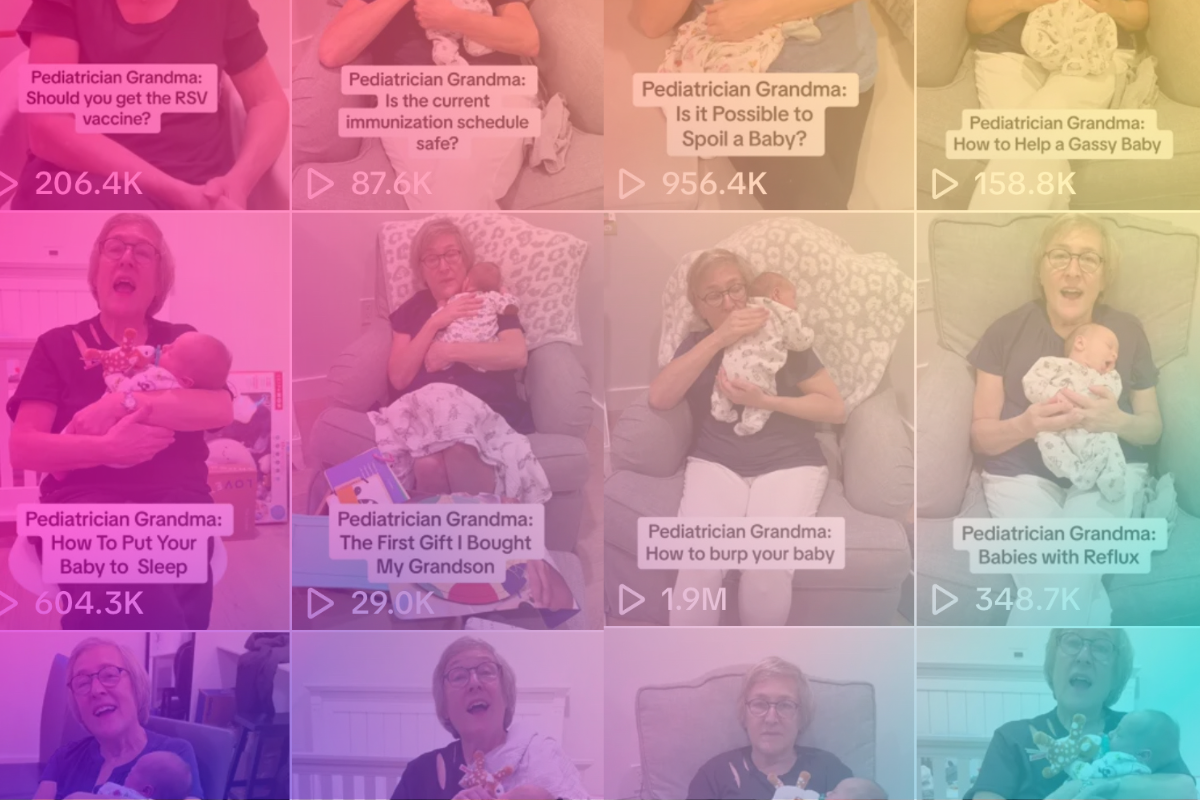Some grandmothers love to say that they have been preparing their whole lives for the role of grandparent. That would definitely be true about Flo Rosen. The newly minted New Jersey “bubbie” had been a pediatrician for over 40 years before she took on the role of grandmother a little under two months ago when her grandson Trent was born.
But a not-so-typical grandparent experience happened next. When Trent was just eight days old, her daughter-in-law, Dalia, posted a video to TikTok of Dr. Rosen’s reaction to her grandson rolling for the first time, which garnered over 5 million views. Dr. Rosen has since posted dozens of videos on her own TikTok account, @ask.bubbie, sharing her expertise as a pediatrician for parents, grandparents and truly anyone who wants to be in a baby’s life — from best first toys, to tummy time, to when it’s safe to kiss a baby, to the unfortunately controversial subject of safe sleep.
Dr. Rosen’s advice is both science-based and empathetic, and the internet most certainly seems to be responding to it — her videos have garnered millions of views and thousands of enthused and curious comments from her over 86K followers. Kveller chatted with the retired pediatrician over e-mail to ask how she’s dealing with her internet fame and what advice she would give fellow bubbes.
Can you tell us how the @ask.bubbie TikTok account came to be?
I was just about the last of my friends to have a grandchild, and not a week has gone by for years without a friend calling to ask a question about their grandchild. I realized that grandparents have no one to call when they have concerns, so I always hoped, after I retired, to provide that resource. I mentioned to my wonderful, very media savvy daughter-in-law that I wanted to start a column and she responded in horror that that was “so old school! You need to be on social media!”
When she filmed my shock and delight at my grandson’s response to his first tummy time, and it went viral, she said it’s time to launch my account. That video now has over 23 million views!
You’ve worked with so many children — has anything surprised you about becoming a grandparent? What is the best part of it?
The best part of being a grandmother is the snuggles — there’s nothing better! I always loved holding my patients and watching them grow, so there’s really nothing surprising about being a grandmother. But it’s very special when it’s your own!
What’s been so heartening for me about your account is that a lot of this knowledge is information that we young parents struggle to share with our kids’ grandparents — especially around issues of safe sleep or feeding. There’s a lot of “well, we did it this way and everything turned out fine.” How would you recommend talking about these issues with less receptive grandparents?
I’ve been very surprised at some of the social media comments. I find it very heartening when parents support each other, and very sad when there’s resistance on the part of grandparents. There is a lot of “we didn’t do this nonsense and my kids turned out fine.” That may be true, but in many cases, that was probably just plain luck. There is so much that parents have no control over, so you just have to try to control what you can, especially around safety.
It helps for parents to be non-confrontational with grandparents and to acknowledge that they have lots of good, commonsense wisdom to share. I try to talk about lots of evidence-based recommendations and explain the reasons for the changes.
Back to sleep recommendations are a good example. A parent can say, ”I know when we were young, you put us on our stomachs to prevent choking. Science has now figured out that the risk of SIDS (or crib death, as some older people know it) is a much bigger risk than choking, and it has really decreased with babies sleeping on their backs. So please put the baby down that way, because otherwise I may not be able to sleep since I’ll be so worried.” That approach may get eye rolls and head shaking, but hopefully, it will also get compliance. The more areas where a parent can ask for their parents’ advice, the less head-butting there will be on other issues.
Can you tell us a bit about what being Jewish means to you?
I am a child of Holocaust survivors and grew up in a very culturally, but not observant, Jewish home. I have been married for 43 years and we have two sons. My kids grew up in, and my husband and I still live in, a very close-knit Jewish community and belong to a Conservative synagogue. My husband and I have both been very involved with our community and our kids were bar mitzvah-ed (is that a word ?) and attended Jewish camps.
Because you’ve seen so many kids grow up, is there anything in particular that you’re looking forward to see Trent do, or to do with him?
My kids’ favorite place was our local JCC camp, the largest in North America. It is just a fabulous place! My dream would be to have Trent for the summer and have him love camp as much as his dad and uncle did!
Do you have any advice for bubbes and bubbes-to-be?
I think they need to really support their children as parents. We all made mistakes, and our kids will, too. Being available, empathetic and non-judgmental can be a great way to support new parents and lead by example.
Any general — non-medical — parenting advice you would give Jewish parents?
I think Jewish values are a wonderful way to raise a child. Teaching your child to be kind, empathetic and intellectually curious imparts some of the most valuable skills a child can learn to navigate the world.








